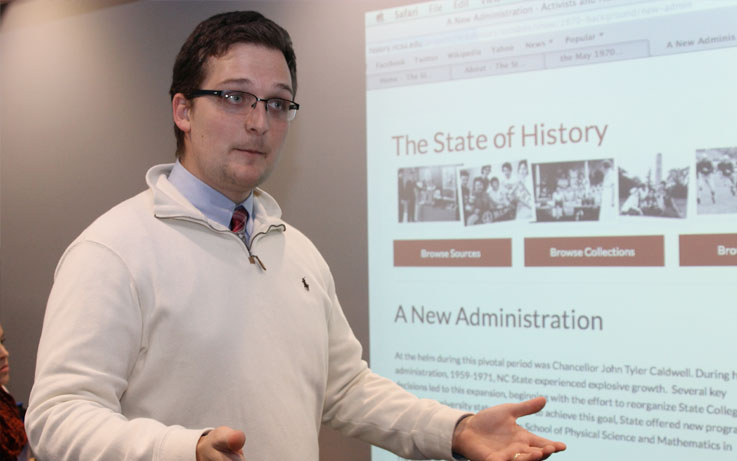
Graduate Students Interpret the “State of History” at NC State

Graduate students in Dr. Susanna Lee’s History 534 take a deep dive into the NCSU Libraries’ Special Collections to create stories that uncover events in NC State history. Students then used the Libraries’ high tech spaces to showcase the complexity of their projects dynamically and interactively.
A Deep Dive Into History
During the Fall 2014 semester, Professor Susanna Lee assigned her graduate students in HI 534: Digital History course a project that involved making extensive use of primary source materials such as official university records, The Technician, the Nubian Message, and selected items from manuscript collections, including correspondence and photographs from the NC State University Libraries’ Special Collections Research Center. For their projects, small teams interpreted important events in NC State history and created online exhibits, which they presented at an open session attended by faculty and library staff. Their work is featured among the student-created exhibits at The State of History.
Professor Lee explained, “I designed the projects to expose students to the full experience of crafting history for a public audience from conceptualizing a topic, to formulating research questions, to conducting research, to making interpretive decisions, and to designing an online exhibit. I required students to focus on NC State because the university is an ever-present feature of our lives but we so rarely pause to consider its rich history.” Dr. Lee said that she was committed to having students take advantage of the resources at their own institution and to explore the history beneath their feet.

At the beginning of the semester, several Special Collections staff members worked with Professor Lee’s students and shared ideas about key themes in NC State history that warranted further research. The students ultimately decided to focus on the following four project themes: agricultural empowerment, race and space, the illusion of inclusion, and activists and authorities.
Throughout the semester, the students spent many hours locating and interpreting the relevant primary source documents in Special Collections and eventually made decisions about which materials needed to be digitized and interpreted for their projects. Once the items were digitized by Special Collections staff members, the students used Omeka, an open source content management system, to create their online digital exhibits. As the students considered how to interpret the historical themes and problems that they were addressing, they also accessed additional secondary source materials such as books and journal articles.
According to Dr. Lee, the projects are constructed to take advantage of the digital medium in order to highlight the “constructed nature of history.” She noted that the audience can read and consider the students’ interpretations of historical events online, but they can also directly consult the historical evidence themselves (also online) and arrive at their own conclusions. The purpose of this design is to teach not only the history of NC State, but also the nature of historical investigation.
Presenting the Projects
On December 2, 2014 the student project teams presented their online exhibits at an open session in the D. H. Hill Library Visualization Lab. Librarians David Woodbury and Marcus Wust were instrumental in setting up the visualization space in order to meet the students’ needs.
The presentations were conducted simultaneously around the room, creating an exciting, active learning space that promoted dialogue and a lively exchange of ideas and feedback. The students were able to project their online exhibits — all available for viewing at the NC State History Department's State of History website — simultaneously onto the four walls of the Visualization Lab.

How It Went
The event was a great success and was attended by numerous library staff members from various departments in addition to the 14 students in Dr. Lee’s class. The effect of multiple presentations going on simultaneously on all four walls created an exciting buzz of activity and generated active discussions amongst the participants and guests. The students engaged with other faculty members and library staff as they discussed their work and addressed the challenges of historical research.
A number of the students acknowledged that one of the most difficult tasks that they faced was digging through the primary source materials in order to find the voices and testimonies of those who participated in specific historic events. As graduate student Josie Titus discovered, it was difficult to find documentation that reflected the voices of the workers when she tried to research the history of African-American university employees. Likewise, graduate student Rebecca Lowe found that it was a challenge to uncover the voices of students who were enrolled in the School of Agriculture and Life Sciences (SALS) from the 1960s to 1980s. As the students grappled with these problems, they learned to understand what is and what is not preserved in the historical record - and why.

Professor Lee was pleased with the outcome. She noted, “Library staff have been extraordinarily generous with their time in assisting students with all aspects of their class projects, including addressing questions about NC State history, collections, copyright, and technology. In particular, the staff at the Special Collections Research Center have gone to great lengths to provide students resources for their projects. Work in the digital humanities is intensely collaborative, and the students could not have completed their projects without the assistance of library staff.” Dr. Lee stated that in the future, she plans to continue working with the library on digital projects that utilize the Special Collections Research Center.









